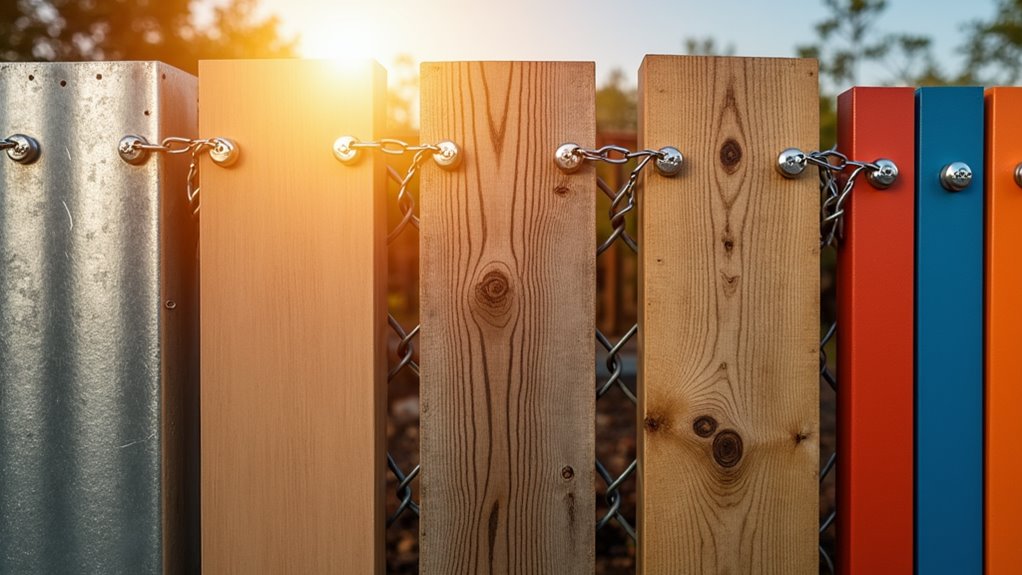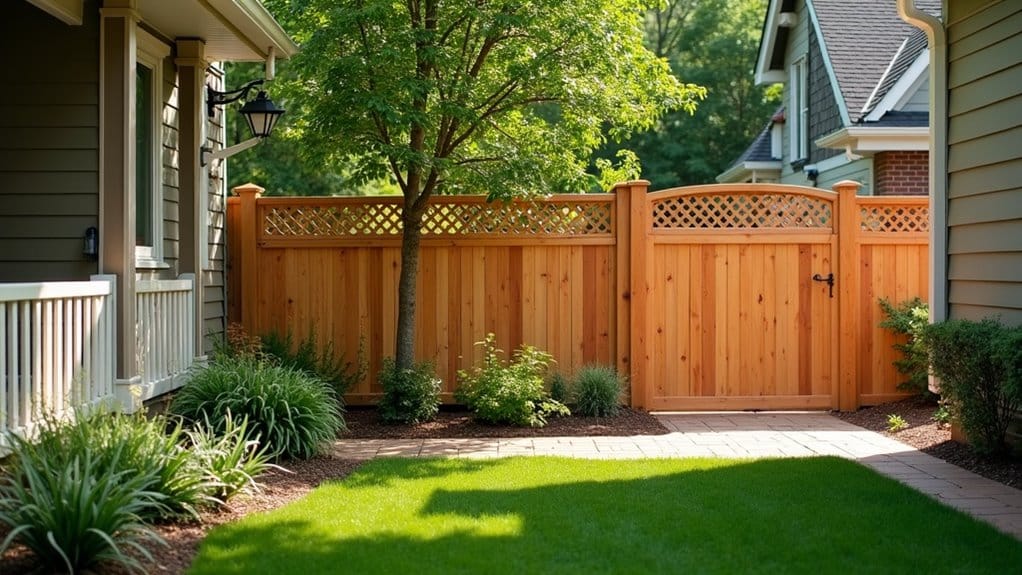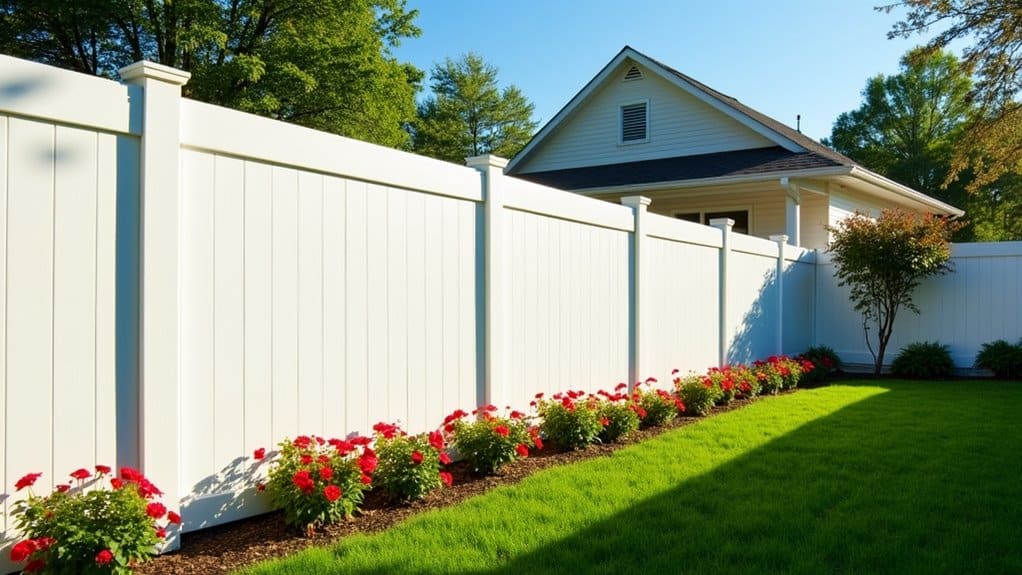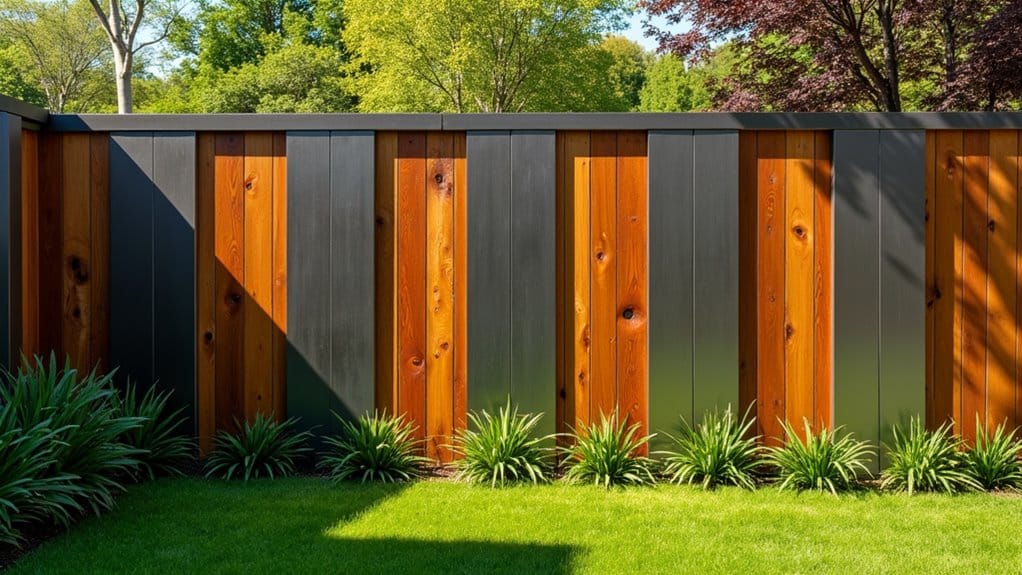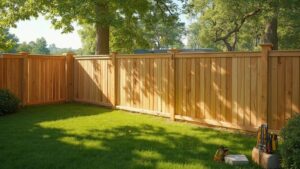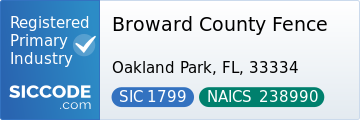When choosing durable fencing materials for commercial use, consider these top five options:
- Chain Link Fencing: Affordable and lasting up to 30 years with proper maintenance.
- Aluminum Fencing: Rust-resistant and visually appealing, it also has a lifespan of around 30 years.
- Vinyl Fencing: Low-maintenance and pest-resistant, vinyl can last between 20 to 30 years.
- Wood Fencing: Combines durability with aesthetic charm, lasting up to 30 years if well cared for.
- Iron Fencing: Offers strong security and a classic look, but it does require regular maintenance.
Explore these materials to find the best option for your commercial needs.
Key Takeaways
- Chain Link Fencing: Affordable and tough, it can last 15-30 years. Great for security, with options like barbed wire for added protection.
- Aluminum Fencing: Sleek and rust-resistant, it requires little upkeep and can last about 30 years. You can customize it with different styles and finishes to match your property.
- Vinyl Fencing: Long-lasting (20-30 years), low maintenance, and resistant to pests. It also has UV protection to keep colors from fading.
- Wood Fencing: Attractive and durable, it can last up to 30 years. Easy to repair but needs regular sealing to protect against moisture.
- Iron Fencing: Strong and stylish, wrought iron is flexible in design. It requires some maintenance, but custom designs can boost both security and aesthetics.
Chain Link Fencing
Chain link fencing is an effective and budget-friendly option for securing commercial properties. Commonly used in places like prisons, sports fields, and playgrounds, it's ideal for businesses that need clear boundaries. Its visibility acts as a deterrent against intruders while allowing you to monitor your property easily.
When installing chain link fencing, pay attention to the gauge. Thicker options, ranging from 12 to 6 gauges, offer better durability. Ensure the posts are set in concrete for strong support, and use tension wire to keep it tight. Additionally, chain link fencing is known for its cost-effective nature, making it a popular choice among various commercial applications.
You can also enhance the look of your fence with vinyl coatings in colors like black, brown, or green. Chain link fencing can last anywhere from 15 to 30 years, depending on how well you maintain it.
For added security, consider options like barbed wire or access control systems. By following these straightforward tips, you can effectively safeguard your commercial property for years.
Aluminum Fencing
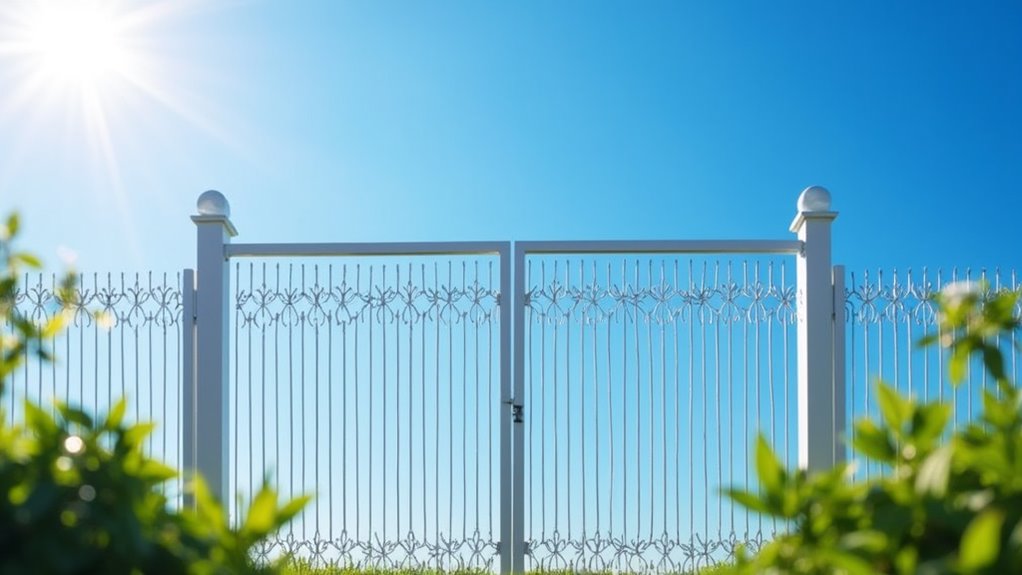
Aluminum fencing is a durable and attractive alternative to chain link fencing, ideal for commercial use. It typically lasts around 30 years, and with proper care, it can even reach 50 years. This type of fencing requires very little maintenance, as it resists rust and corrosion—just an occasional cleaning is enough to keep it looking good. Additionally, marine-grade alloys are used for enhanced strength and corrosion resistance.
Meeting AAMA-2604 standards, aluminum fencing won't fade or deteriorate easily. High-quality materials and advanced coatings enhance its durability, while the thickness of the metal contributes to its strength. Additionally, quality aluminum fences can last upwards of 50 years without rusting, providing an exceptional return on investment.
In terms of looks, aluminum fences come in various styles and finishes, allowing you to customize them to fit your property. They offer solid security without sacrificing appearance, making them a great choice for businesses.
Although the upfront cost may be higher than other materials, the long-term savings and low maintenance make aluminum fencing a smart investment.
Vinyl Fencing
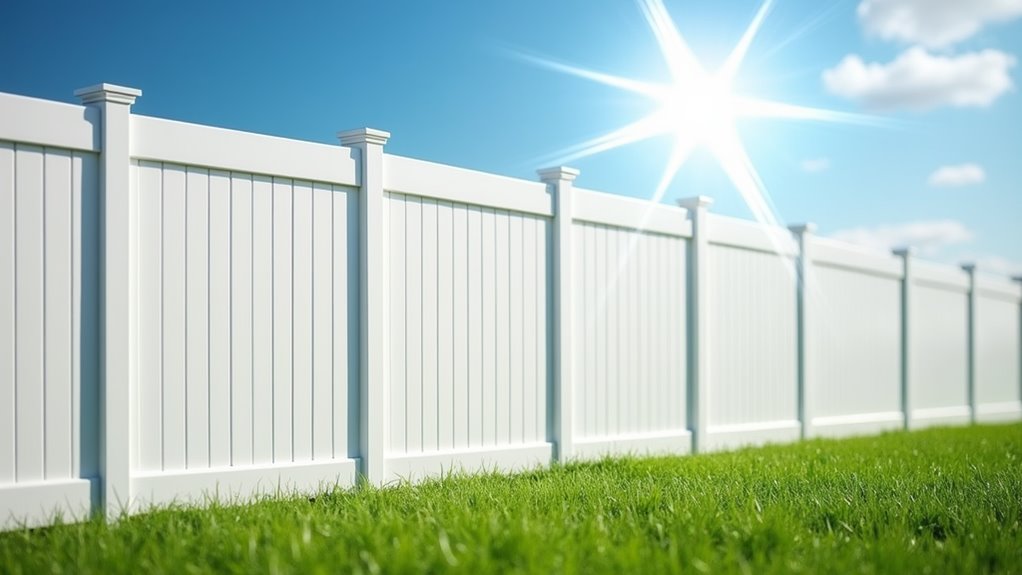
Vinyl fencing may not be as popular as aluminum, but it's an excellent choice for commercial use due to its durability and minimal upkeep. With a lifespan of 20 to 30 years — and potentially longer with proper care — vinyl fences can withstand extreme weather without rotting, warping, or rusting. One of the biggest advantages of vinyl fencing is its low maintenance. Unlike wood, it doesn't require regular painting or staining; a simple wash with water and mild soap is usually enough. Plus, it's resistant to pests like termites, ensuring long-lasting integrity. The UV protection, thanks to additives like titanium dioxide, helps keep the colors vibrant without fading. Additionally, premium-quality vinyl can exceed 30 years when properly maintained. To maximize the lifespan of your vinyl fence, ensure it's installed correctly and conduct regular inspections. Vinyl fencing's minimal maintenance needed allows businesses to focus on their operations rather than upkeep.
Wood Fencing
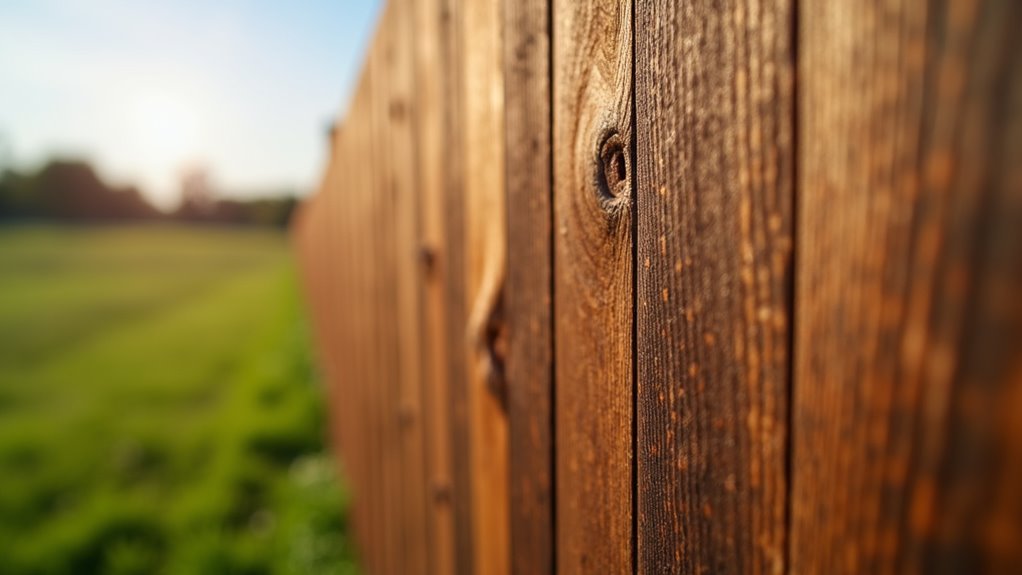
Why choose wood fencing for your commercial property? It combines durability, visual appeal, and straightforward repairs, making it a practical solution for businesses. With proper installation and maintenance, certain wood types can last up to 30 years, although many wooden fences typically last 10-15 years depending on maintenance. Proper maintenance is essential to ensure the longevity of wooden fences.
Here are some advantages:
- Natural Durability: Solid wood handles tough weather better than hollow options.
- Easy Repairs: You can replace single planks without affecting the entire fence.
- Variety of Wood Types: Choices like cedar, redwood, and pine let you customize based on your needs.
To extend your wood fence's life, follow these maintenance tips: regularly seal and stain the wood to guard against moisture and pests, and opt for high-quality wood known for decay resistance.
While untreated wood may last only 5-10 years, proper care can significantly enhance its lifespan, making wood a smart investment for your commercial space.
Iron Fencing
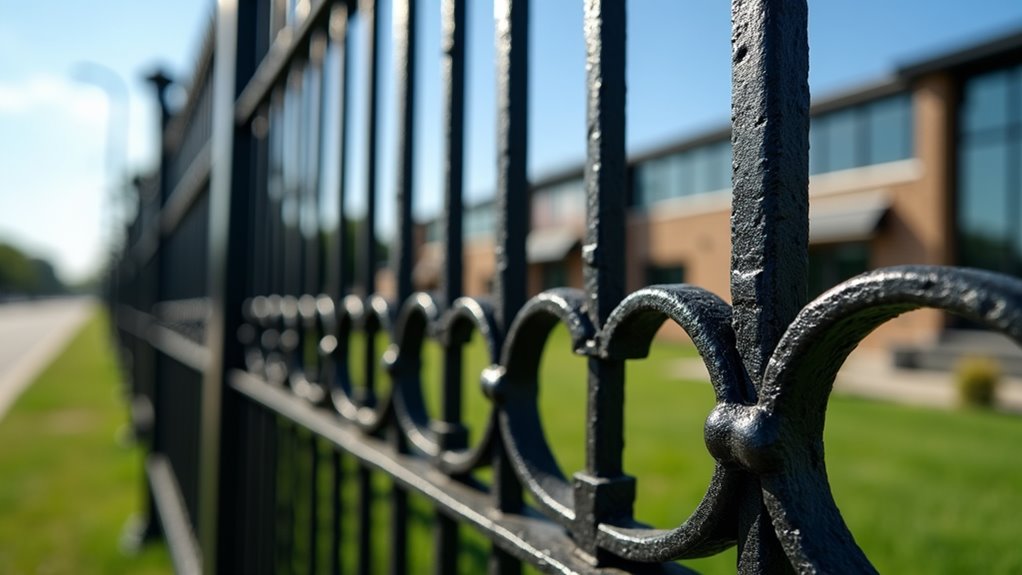
When choosing fencing for your commercial property, iron fencing is a strong option that combines security with style. Wrought iron is often preferred over cast iron due to its flexibility and durability. Plus, its decorative designs can enhance your property's look. The lifespan of iron fencing can be affected by factors like weather and finish. To prevent rust, especially in humid areas, it's vital to reduce moisture exposure. Using powder coating instead of regular paint can significantly improve resistance to the elements. To keep your iron fence in good shape, routine maintenance is key. This includes trimming plants nearby to avoid moisture buildup and cleaning with mild soap and water. Address any rust spots quickly by sanding or wire brushing them to prevent further issues. Professional installation with quality materials ensures your iron fence meets security needs and complies with ICC pool code requirements. Additionally, choosing a material like iron fencing can provide significant durability and longevity compared to other options. With a range of heights and custom designs available, iron fencing is a practical choice for any commercial setting.
Frequently Asked Questions
What Is the Lifespan of Each Fencing Material?
When comparing fence lifespans, wood fences can last between 4 to 30 years based on treatment, while vinyl and chain link typically last around 20 to 30 years. Metal fences, however, can last over 50 years with proper care, making them a durable choice.
How Do Weather Conditions Affect Different Fencing Types?
Weather conditions impact fencing types differently. For example, strong winds can damage vinyl fences over time, while aluminum and composite fences tend to withstand harsh weather better, offering greater durability. Choosing the right material can ensure your fence lasts longer despite the elements.
Are There Any Warranties Available for These Fencing Materials?
Yes, there are several warranty options for fencing materials. These include lifetime guarantees for defects, installation warranties, and warranties that cover environmental damage. Be sure to review the specific terms for each option.
Can I Paint or Customize These Fencing Options?
Yes, you can customize your fencing! For wood, use acrylic latex paint, and for vinyl, epoxy-based paints work best. Just remember to prep the surface well for better adhesion and durability.
What Are the Best Installation Practices for Commercial Fencing?
To install commercial fencing effectively, follow these key steps:
- Know the Rules: Check local regulations to avoid fines or issues.
- Mark Your Lines: Clearly outline where the fence will go to ensure accuracy.
- Dig Post Holes: Make sure the holes are deep enough for stability—typically one-third of the post should be underground.
- Secure Panels: Attach fence panels tightly to prevent sagging or damage.
Conclusion
Choosing the right fencing material for your commercial property is crucial for ensuring durability and security. For example, chain link fencing can last over 20 years with little maintenance, making it a cost-effective choice. Each material—aluminum, vinyl, wood, and iron—has its own advantages, catering to different needs. By assessing these options, you can ensure your investment lasts, providing safety and visual appeal for years.

